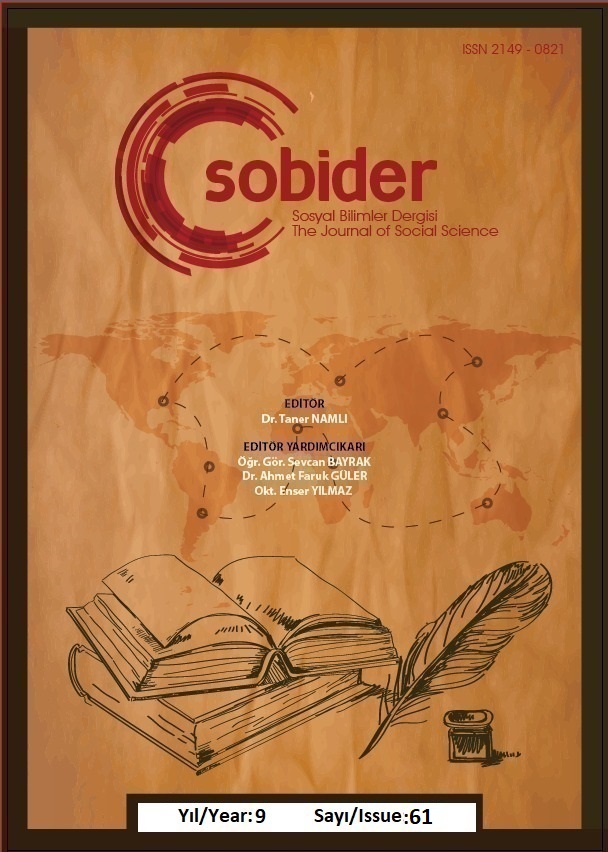SİNAN PAŞA’NIN TAŻARRUʿ-NĀME ADLI ESERİNDE SIFATLAMA FONKSİYONLU İSİM TAMLAMASI KURAN EKLER KATEGORİSİ
Author :
Abstract
Türk dilinde ortaya çıkan ihtilaflardan nasibini alan bir unsur da şüphesiz isim tamlaması kuran ekler olmuştur. Bunlardan da çalışmamıza konu olan sıfatlama ekleri olmuştur. Sıfat adı altında ortaya atılan unsurun, şekil esaslı ele alınarak farklı bir kelime türü sayılması, sıfatlama fonksiyonunu icra eden eklerin yapım eki olarak görülmesi, sıfatın bir tamlama olduğu algısı ve benzeri sebeplerin tümü çalışmanın ortaya çıkmasına zemin hazırlayan unsurlardandır. Çalışmada sıfatlama fonksiyonlu eklerin, yaygın gramercilik faaliyetlerinde nasıl ele alındığı ve Türk dilinin ekleşme kültürü içerisinde nasıl ele alınması gerektiğinin sebepleri alana katkı sunan araştırmacıların çalışmalarından da yola çıkılarak anlatılmıştır. Türk dilinin grameri, sahip olduğu ekleşme kültüründe fonksiyon temelli bir kimlik ile mevcuttur. Söz konusu kimlik her ekin, şekil odaklı bir anlayıştan bağımsız olarak algılanması hususuna dikkat çekmektedir. Çalışmamızda ele aldığımız Sıfatlama ekleri, merhum Sinan Paşa’ya ait Tażarruʿ-nāme adlı eserde incelenerek sözü edilen fonksiyon temelli bakış açısı ile incelenmiş ve fonksiyonlara ait veriler bir tabloda verilerek anlatılmıştır.
Keywords
Abstract
Undoubtedly, an element that got its share of the conflicts that arose in the Turkish language was the suffixes that formed the noun phrase. Among these, there are adjective suffixes that are the subject of our study. The fact that the element put forward under the name of the adjective is considered as a different word type by considering it based on form, that the suffixes that perform the adjective function are seen as a constructional suffix, the perception that the adjective is a noun phrase and similar reasons are all factors that pave the way for the emergence of the study. In the study, how the adjective-function affixes are handled in common grammar activities and the reasons why the Turkish language should be handled within the suffix culture are explained based on the studies of the researchers who contributed to the field. The grammar of the Turkish language exists with a function-based identity in its attachment culture. This identity draws attention to the fact that each suffix is perceived independently of a shape-oriented understanding. The Adjective suffixes that we discussed in our study were examined in the work named Tażarruʿ-nāme belonging to the late Sinan Pasha, examined with the aforementioned function-based point of view, and the data of the functions were explained by giving them in a table.
Keywords
- Balcı, Emine (2019). Ahmetcan Aşiri’nin “İdikut” İsimli Romanında Sıfat İsim Ekleri. Yayımlanmamış Yüksek Lisans Tezi. Kastamonu: Kastamonu Üniversitesi, Sosyal Bilimler Üniversitesi.
- Banguoğlu, Tahsin (1974). Türkçenin Grameri. İstanbul: Baha Matbaası.
- Demir, Tufan (2004). Türkçe Dilbilgisi. Ankara: Kurmay Yayınları.
- Ergin, Muharrem (1984). Türk Dil Bilgisi, İstanbul: Boğaziçi Yayınlar.
- Ertaylan, İsmail Hikmet (1961). Sinan Paşa Maarifnâme. İstanbul: Edebiyat Fakültesi Basımevi.
- Hatipoğlu, Necip (2000). Üniversitede Türk Dili Dersleri, Ankara: Seçkin Yayınlar.
- Jean, Deny (2009). Türk Dil Bilgisi, İstanbul: Kabalcı Yayınları.
- Karaağaç, Günay ( 2013). Türkçenin Dil Bilgisi, Ankara: Akçağ Yayınları.
- Keskin, Raşit (2003). Türkçe Dil Bilgisi, Konya: Çizgi Kitabevi.
- Korkmaz, Zeynep (2009). Türkiye Türkçesi Gramer Şekil Bilgisi, Ankara: Türk Dil Kurumu Yayınları.
- Kuş, Bahri (2020). Görevlendirmenin Eş Zamanlılığı Işığında /+sIz/ Morfeminin Hal Kategorisindeki Yeri. Ed. Süleyman Efendioğlu ve Hüsna Kotan. Prof. Dr. Avni Gözütok- Armağan Kitap. Erzurum: Atatürk Üniversitesi Yayınları. s. 435-447.
- Şerifoğlu, Yasin (2015). “Türkiye Türkçesinde İsimleri Sıfat Yapan Eklerin Durumları Üzerine Bir İnceleme ve Yeni Bir Terim Önerisi”. Türük Uluslararası Dil, Edebiyat ve Halkbilimi Araştırmaları Dergisi, S. 6, s. 71-78.
- Tek, Emel (2018). “Kendi Gök Kubbemiz’de İsim Tamlaması Kuran Ekler Kategorisi”. Türük Uluslararası Dil, Edebiyat ve Halkbilimi Araştırmaları Dergisi, S. 12, s. 395-408.
- Topçu, Çiğdem (2015). “Yap-(Im) Ve Yap-(Im) İle İlişkilendirilen İfadelerin Dil Bilgisindeki Yeri”. 10. Uluslararası Büyük Türk Dili Kurultayı Bildirileri. Ankara.
- Tulum, Mertol (2014). Tazarruʿnâme, İstanbul: Türkiye Yazma Eserler Kurumu Başkanlığı
- Tuna, Osman Nedim (1986). Türk Dilbilgisi (Fonetik Ve Morfoloji). Malatya: İnönü Üniversitesi Eğitim Fakültesi, Türk Dili ve Edebiyatı Bölümü Ders Notları.
- Turan, Zikri (2000). “Türkçenin Yapım Ve Çekim Düzeninde Yer Alan Eklerin Sınıflandırılması Nasıl Olmalıdır?”. 4.Uluslarası Türk Dili Kurultayı. 25-29 Eylül 2000. Çeşme-İzmir.
- Turan, Zikri. (2008). Gösterme Sıfat Fiili. Prof. Dr. Ahmet Bican Ercilasun Armağanı, Ankara: Akçağ Yayınları. s. 235-244.
- Turan, Zikri, (2010). “Türk Dilinin Söz Diziminde Yer Ödünçlemesi”. III. Uluslararası Dünya Dili Türkçe Sempozyumu. s. 908-914. 16-18 Aralık 2010. İzmir.
- Turan, Zikri, (2015). “Türk Dilinde Sıfatlama Ekleri”. X. Uluslararası Büyük Türk Dili Kurultayı Bildirileri. 28 Eylül-1 Ekim 2015. Saraybosna.
- Turan, Zikri (2016). “Türk Dilinin Eklerini Sınıflandırmanın Esasları”. TDK Türk Dil Bilgisi Toplantıları Ve Eklerin Sınıflandırılması Sempozyumu. İstanbul.
- Turan, Zikri (2018). “Türk Dilinin Eklerini Sınıflandırmanın Esasları”. Türkbilig Dergisi, S. 35, s. 97-110.





